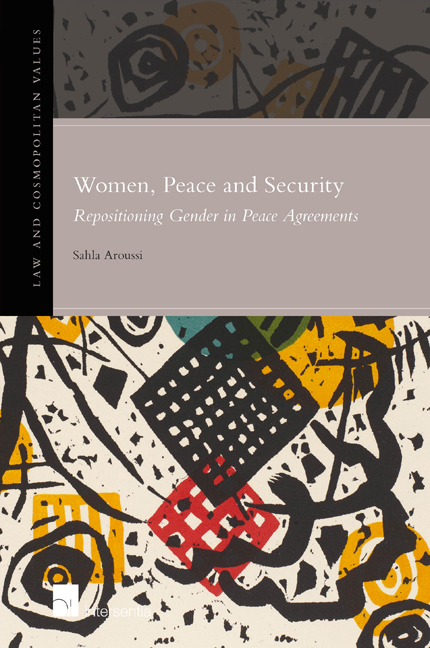Book contents
- Frontmatter
- Acknowledgements
- Contents
- List of Abbreviations
- List of Tables and Figures
- Introduction
- Chapter 1 The United Nations Resolutions on Women, Peace and Security
- Chapter 2 The Gender of Peace Agreements
- Chapter 3 Overview of Gender Provisions in Peace Agreements
- Chapter 4 Women's Political Participation in Peace Agreements
- Chapter 5 Gender-Based Violence
- Chapter 6 Perspectives from the Field
- Conclusion
- References
- Law and Cosmopolitan Values
- Instructions to authors
Chapter 5 - Gender-Based Violence
Published online by Cambridge University Press: 12 December 2017
- Frontmatter
- Acknowledgements
- Contents
- List of Abbreviations
- List of Tables and Figures
- Introduction
- Chapter 1 The United Nations Resolutions on Women, Peace and Security
- Chapter 2 The Gender of Peace Agreements
- Chapter 3 Overview of Gender Provisions in Peace Agreements
- Chapter 4 Women's Political Participation in Peace Agreements
- Chapter 5 Gender-Based Violence
- Chapter 6 Perspectives from the Field
- Conclusion
- References
- Law and Cosmopolitan Values
- Instructions to authors
Summary
'I was abducted by the LRA when I was only 12 years old … I was forced to become one of Kony's 27 “wives”. I never got the chance to go to school. After 11 years in the Bush, I managed to escape. I now live with my own and two other adopted children whose mother died. Upon return from captivity we, as former abductees, faced a lot of stigma and discrimination. Following demobilisation, the government is supporting the men but gave nothing to us. We were forced to go with the LRA but the government treated us like we went there willingly. It is like they have forgotten that our time has been wasted and that these men are the same men that slept with us and made us give birth to children from a very young age. Now we are home, it is us the mothers who are taking care of these children and not the fathers and yet the government is not supporting us.'
Evelyn Amony, Kitgum Northern Uganda, November 2011During conflicts women, like men, are murdered, tortured, displaced, imprisoned, dispossessed, starved and forced into slave labour. Yet, in addition to these crimes, women and girls are particularly targeted for sexual violence. Sexual violence, though often associated with rape encompasses a wide array of other forms of attack including but not limited to: sexual assault; sexual slavery; sexual torture; forced nudity; forced prostitution; forced impregnation; forced sterilisation; forced marriages; and sexual mutilation. While there is growing evidence that men and boys are sometimes also victims of sexual abuse during conflicts, systemic and organised abuse of women remains much more common. Sexual crimes are not particular to certain types of conflicts or culture but are exceedingly commonplace during internal and international armed conflicts around the world and at all times.
Sexual violence has detrimental and overreaching consequences for women, their families, communities and the ethnic group to which they belong. This is especially true given that the concept of shame associated with the rape of women in peacetime continues for the sexual violence committed in conflicts. Rape and sexual crimes have destructive socio-economic and health effects on women's lives.
- Type
- Chapter
- Information
- Women, Peace, and SecurityRepositioning gender in peace agreements, pp. 193 - 256Publisher: IntersentiaPrint publication year: 2015



